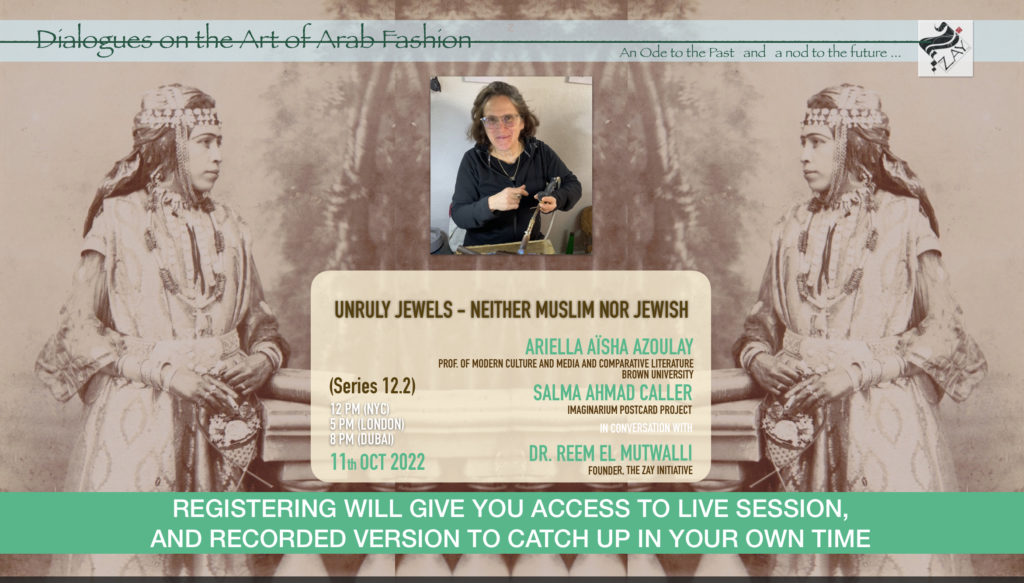




12.2 DIALOGUES ON THE ART OF ARAB DRESS: UNRULY JEWELS – NEITHER MUSLIM NOR JEWISH
Event Description: Looking at some photographs, postcards, and jewels, Azoulay will question the investment of the French colonial project in the de-algerisation and de-arabisation of the Jews in Muslim countries. One of the signs of their “success” in turning the indigenous into a “modern type” was the withdrawal of the Jews from wearing heavy jewels and clothing with gold thread embroidery, through the production of these gold threads and jewels was a craft Jews used to practice for centuries. The disappearance of the jewels from their bodies was not a simple change in mode, but rather a disruption of a world in which craft and craft making was essential for world building and for world maintenance, and was embedded in guilds that were part of the social fabrics of mutual care.
Ariella Aïsha Sha: It is a gauze like sheer silk fabric characterised by its crispness. It is often used to make unlined summer, generally informal, kimonos. Azoulay, professor of Modern Culture and Media and Comparative Literature (Brown University), film essayist and curator of archives and exhibitions. Her books include: Potential History – Unlearning Imperialism (Verso, 2019), Civil Imagination: The Political Ontology of Photography (Verso, 2012), The Civil Contract of Photography (Zone Books, 2008). Among her films: Un-documented: Unlearning Imperial Plunder (2019), Civil Alliances, Palestine, 47-48 (2012). Among her exhibitions Errata (Fundació Tàpies, 2019, HKW, Berlin, 2020), and Enough! The Natural Violence of New World Order, (F/Stop photography festival, Leipzig, 2016).
Salma Ahmad Caller, was born in Iraq to an Egyptian father and a British mother and grew up in Nigeria and Saudi Arabia. She now lives in the UK. An artist, art historian, and writer, Salma considers herself a disruptive body, a hybrid of cultures and faiths. Her work explores her mixed-race identity, cross-cultural experiences, text/image relationships, and forms of embodiment, materiality, and memory, drawing on personal intimate family histories and vulnerability as a way to destabilise larger narratives. Uncanny juxtapositions and hybrid forms are used to investigate how the private and political collide and intertwine, using techniques of collage, assemblage, drawing, watercolour, photography, projection, installation/sound, and more recently film. Salma also writes art theory, poetry, and creative non-fiction. Her theoretical background in research on the meanings of ornament in non-Western cultures through frameworks of anthropology of art and cognitive science/physiology are used to decolonise and break down boundaries, categories, typologies and terminology that characterise hegemonic colonial and patriarchal formations. With a Masters in art history and art theory, and a background in medicine and pharmacology, and several years of teaching cross-cultural ways of seeing via non-Western artefacts at Pitt Rivers Museum in Oxford, she now works as an independent artist and teacher.
Date: 11th October 2022
Time:12 Noon NYC, 5 PM UK, 8 PM UAE
Tickets: Donation
Students: If you are a student or member of academia please register here to receive your complimentary registration links.
Registering will not only give you access to the live session but also a recorded version to catch up on in your own time.